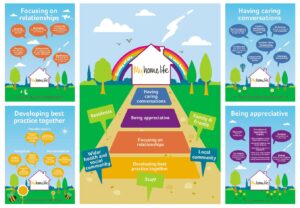Aging | Global Aging | Home Care | April 20, 2016
My Home Life: Research and Reflection On The Role of Care Providers
BY GlobalAgeing
How should we think about our roles as providers vis a vis the people we serve? Professor Julienne Meyer of City University of London reflects on My Home Life, a research-based initiative focused on what older people want and what it demands of us as providers:
“Developing best practice together comprises 8 themes: two link to quality of leadership (Transformation themes – Keeping workforce fit for purpose and Promoting positive cultures), three to quality of life (Personalisation themes – Maintaining identity, Sharing decision-making, Creating community) and three to quality of care (Navigation themes – Managing transitions, Improving health and healthcare, Supporting good end-of-life)[1]. Unfortunately in UK, we have been educated in silos. Social care staff think about the quality of life themes and health care staff think about the quality of care themes. Older people want all staff to think about all of the themes, not just one subset. Again, because we are educated in silos, managers think about quality of leadership (Transformation themes), but don’t always have a vision of what older people want (Personalisation and Navigation themes). The eight best practice themes are helpful at the organisational level to keep in mind what we are all trying to achieve when caring for older people.
At the core of this vision, is the need to focus on relationships – not only enhancing the relationships between residents, family/friends and staff; but also, relationships between care homes and their local community and the wider health and social care system. To do this, research suggests we should not only think about the needs of older people living and dying in care homes, but also the needs of family/friends who visit and the staff who work in care homes. We need to help each group feel a sense of security, continuity, belonging, purpose, achievement and significance[2]. This is helpful when planning individual outcomes for older people, family/friends and staff.
Being appreciative is the way in which My Home Life (www.myhomelife.org.uk) encourages practice improvement through reflection. The starting point is understanding what people ‘want’ and ‘what works’, before moving on to think about what more needs to happen to make it even better, more of the time. The focus is on capabilities and assets, not deficits[3].
Finally the above will only be achieved if we change the way we talk with each other. Having caring conversations[4] is at the heart of My Home Life and encourages us in our conversations to be courageous, connect emotionally, be curious, collaborate, consider other perspectives, compromise and celebrate.”
[1] NCHR&D Forum (2007) My Home Life: Quality of life in care homes – Literature review, London: Help the Aged (Available at: http://myhomelife.org.uk/wp-content/uploads/2014/11/mhl_review.pdf)
[2] Nolan, M., Brown, J., Davies, S., Nolan, J. and J. Keady. (2006). The Senses Framework: Improving care for older people through a relationship-centred approach. University of Sheffield. ISBN 1-902411-44-7.
[3] Reed, J (2007) Appreciative Inquiry. Research for Change, London: Sage.
[4] Dewar B and Nolan M (2013) Caring about caring: Developing a model to implement compassionate relationship centred care in an older people care setting, International Journal of Nursing Studies, 50(9):1247-58.

Recently Added
February 19, 2026
Statement to the United Nations: February 2026
January 22, 2026
January Statement from Vic Rayner
Translate »




